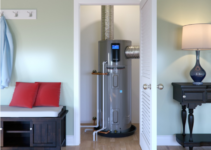Are you looking for an efficient and reliable 75-gallon gas water heater? Let us guide you through the complex process of choosing a water heater. Here, we provide a comprehensive review of the best 75-gallon gas water heater options to help make your decision making easier.
You will be able to pick the best one for you and your home in no time!
This guide is designed to help those in the market for a new household hot water heater. It explains the fundamentals of gas-powered residential water heaters and their uses, provides some factors to consider when selecting a system, and outlines the benefits of choosing a 75-gallon gas water heater system.
Gas-fueled hot water heaters make up the majority of residential systems in use. As such, they come with considerable added benefits compared to electric models that you should consider before making your purchase. Some benefits of choosing a 75-gallon gas water heater include: energy efficiency, heating capacity, design flexibility, quick hot water access, and cost savings versus larger capacity systems.
When purchasing a new residence hot water heater, there are several factors to keep in mind. First and foremost is safety; all models should be properly ventilated and equipped with adequate safety features for your peace of mind. Additionally, it’s important to evaluate how much hot water your home needs each day in order to determine the size that best suits your lifestyle. Other considerations include installation costs, energy requirements and fuel compatibility with existing equipment in your home.
After reviewing this guide you should be well informed on what makes a 75 gallon gas water heater an ideal solution amongst its peers — enabling you to make an informed purchase decision that satisfies both immediate as well as long-term needs!
Explanation of the importance of hot water in daily life
Hot water is an essential part of daily life for countless people worldwide. In the home, it is used for washing dishes and clothing, cleaning bathrooms, and providing effective and comfortable heat during cold seasons. Furthermore, hot water in businesses helps reduce energy costs and increases production efficiency by decreasing downtime due to heating hot materials or parts.
For most of us, the source of that hot water comes from a gas-powered water heater. Gas-powered heaters provide a steady flow of hot water that can get replenished more quickly than electric boilers or any other hot-water systems. As such, 75 gallon gas water heaters are becoming increasingly popular due to their large capacity and easy maintenance. A comprehensive review of the features, benefits and drawbacks of this type of heater can help you make an informed decision when shopping for a new heater for your home or business.

Brief explanation of water heaters and their types
A water heater is a device that heats cold water and distributes it to different points of use, such as showers, dishwashers, washing machines, and sinks in the home. There are many different types of water heaters, with the most popular including electric, propane (LP), and natural gas models. Each type of water heater has its own advantages and disadvantages in terms of cost, efficiency, installation requirements, safety considerations and tank size. In this article we will provide an overview of each type of water heater and discuss the features to consider before purchasing a new model.
Electric Water Heaters: Electric water heaters are popular for their low upfront cost and ease of installation. They are also energy efficient because they don’t require a pilot light or combustible fuel to heat the water. The main drawback is that electric models tend to be more expensive to operate because electricity costs more than natural gas or LP gas in most areas. Electric models come in various sizes from 15-gallon 20-gallon 50-gallon 75-gallons or larger tanks that allow for greater hot water output over longer periods of time.
Propane (LP) Water Heaters: Propane (LP) gas is a less common but ideal choice in many rural locations because it’s readily available at low cost compared to electricity or natural gas. Propane units heat much faster than electric ones but may have higher operating costs due to their reliance on fuel prices which can fluctuate over time. Installation is typically less complicated than an electric model as long as you have access to propane supply lines and outlets near your home where the unit needs to be installed Tank sizes range from 15-gallon up to 75 gallon models with larger models providing higher hot water output for longer periods of time
Natural Gas Water Heaters: Natural Gas Water Heaters provide fast hot water delivery with relatively inexpensive operating costs compared with other fuels like electricity or propane (LP). These units require a direct connection from a source line generally located outdoors near your home where it can be connected through either an existing natural gas line connection or by running new piping from the source line into the structure Natural gas “tankless” models can also be used effectively for smaller applications such as vacation homes where less hot water output is needed but still desire energy savings over electric options Tank sizes range from 15 gallon up 75 gallon capacities similar as noted above
Features to look for in a 75-gallon gas water heater
When shopping for a 75-gallon gas water heater, there are several different features to keep in mind to ensure that the product you are purchasing meets your needs. Consider the following:
Type of Gas: Depending on where you live, the options available for types of gas may vary. Check with your local utility or fuel provider to make sure that the type of gas available in your area will work with the water heater you are considering purchasing.
Size: Make sure that the size of the 75-gallon water heater is appropriate for the space where it is going to be installed – many times this means measuring both length and width, as well as ceiling height. This will help to give you an idea of how much room it will take up in your home.
BTU Output: Check to see what BTU (British Thermal Units) output rate your new heating uses and compare it with similar models from other manufacturers. The higher a water heater’s BTU output, the faster it can heat up a given volume of water. This means that units with higher BTUs will require less energy for the same amount of hot water, which can translate into lower monthly energy bills.
Efficiency Ratings: Choose a model with an Energy Star rating (the highest rated model) or one that meets or exceeds current energy efficiency standards set by local regulations. The higher its Energy Star rating, the more efficient and cost-effective your new heating unit will be over time. Additionally, consider how quickly it heats up and how long it maintains consistently warm temperatures throughout its tank after initial heating cycles – this is referred to as thermal efficiency. The better insulated a model is, and thus retaining more heat over time, often results in longer periods between needed cycles for hot water use – saving energy costs retroactively over time versus choosing less efficient models which need frequent reheating cycles based on demands placed upon them by useage patterns within households using them on daily basis).
Tank material and size
Depending on the desired storage capacity, water heaters are typically made with either welded steel or fiberglass-lined steel. Steel tanks typically range from 30 to 75 gallon capacities and consist of heavy-gauge steel for improved durability and longevity.
Fiberglass-lined steel tanks are more expensive than traditional steel but offer improved corrosion resistance. In addition to capacity, tank sizes also vary by diameter and height, allowing homeowners to choose diameters as small as 20 inches to accommodate smaller spaces such as closets.
Recovery rate and first-hour rating
When shopping for a water heater, recovery rate and first-hour rating are very important considerations. The recovery rate is the number of gallons of hot water that can be produced per hour (gph). It’s measured at a temperature rise of 90 degrees Fahrenheit, so the higher this number is, the faster you’ll have hot water back after it’s been used.
The first-hour rating (also called peak hour demand or FHR) takes into account the tank size to figure out the maximum amount of hot water you can use in one hour without running out. This factors in how much hot water you’ll use per day and how quickly your tank recharges after it’s been used up.
A 75 gallon gas water heater should offer an impressive recovery rate and first-hour rating, allowing you to meet most if not all your daily needs with ease.
Energy efficiency
When selecting a 75 gallon gas water heater, energy efficiency is an important factor to consider. As with any household appliance, you will want your water heater to consume as little energy as possible while providing enough hot water for your family’s needs.
Look for features such as high efficiency burners and an insulated tank that reduce the amount of energy consumed by the unit and help save money on monthly utility bills. By insulating both the interior tank and the exterior surface you can minimize heat loss from the unit and maximum efficiency overall.
Another great feature to look for is an electronic ignition system that turns off when not in use and only turns on when hot water is needed. This helps further conserve energy by eliminating standby losses associated with traditional pilot light systems.
Installation and maintenance of 75-gallon gas water heaters
Installation and maintenance of a 75-gallon gas water heater, while not overly complicated, may require some specialized skills and tools. It is recommended that the homeowner first assess their ability to safely and correctly install the unit. If any doubts arise, it is best to contact a qualified technician. Here we provide an overview of the steps to be taken during the installation process:
1) Inspect the area: Make sure there are no obstructions that could interfere with proper placement of the gas water heater.
2) Coordinate with utility provider: Check if there is already a gas line running to your home; if not, contact your utility provider to set up service.
3) Adjust temperature setting: Adjust the temperature setting on your water heater (recommended settings are 110-120 degrees Fahrenheit).
4) Replace defective parts: Replace any obsolete or defective parts before continuing with installation.
5) Connect hot and cold water lines: Connect hot and cold water lines to piping system or heater control valve (if applicable).
6) Check venting system: Install suitable venting material as per manufacturer’s instructions. Use only approved materials for compatibility with your 75-gallon gas water heater model.
7) Secure installation base: If using an accessory mounting base for stability, secure two 2” lag screws into plywood near corners at the bottom piece of board on each side of model of unit being installed (if applicable). Not all models require a lag screw; refer to manufacturer’s instructions before proceeding further.
8) Test pressure relief valve and thermostat functions: Test pressure relief valve manually by activating it several times until full suction occurs; check thermostat setting by activating dial past 126 degrees Fahrenheit several times until maximum heat has been reached ( then reset thermostat back to safe setting ).

Steps for installing a 75-gallon gas water heater
Installing a 75-gallon gas water heater can be an intimidating task. There are several steps and precautions to take when installing a high-capacity unit. To ensure that your new hot water appliance is installed correctly and safely, follow these steps:
- Turn off the gas supply. When you have your new unit in place, be sure to turn off the flow of natural gas or propane to your home by simply shutting off the gas valve at the main source of supply. If you are going to be connecting a large tankless heater, it will require its own shutoff valve at the main source.
- Connect the water line. Unscrew the cold water pipe from the wall and connect it to the cold inlet side (marked ‘C’) on your tank with connectors and flexible tubing, following manufacturer instructions and local codes for safe installation. Make sure any connections are cleanly sealed with pipe thread tape or plumber’s putty so there will not be any leaks present after installation is complete.
- Connect a safety pressure release valve on top of the new tank near its outlet connection so that excessive pressure caused by sudden inflows of hot water into colder lines can be released safely into an open drain line instead of into your home plumbing system or heating system parts; this will help avoid flooding, overpressurizing your system, or serious injury from resulting steam burns if pressure reaches unsafe levels.
- Connect and secure flame arrestor plates at both intake and exhaust points on each side of all types of plastic tanks with heat resistive materials or other special safety tabs—and usually by flat washers, hexagonal nuts, lock nuts or similar connectors—to help contain flare-up potentials from errant sparks or improperly vented hot gases released during combustion process when venting arrangements are not as close as specified for distance/height between units’ inlet/outlet connections; also secure leftover space between all pipes in walls/ceilings affected before pipes reach flue opening through roof coverings.
- Mount controls on wall right next to unit securely then attach wiring harnesses accordingly by keeping all electrical device wires properly separated from heat source pipes carrying combustion exhaust gases exiting appliance’s flue opening; make sure appliances have ground fault circuit interrupters (GFCI) tested regularly according to manufacturer specs located within 6 feet (2 meters) radius of unit’s location.
- Check all fittings these needs turning until they stick gently against each other one more time after they already have been bolted fast prior to complete connection ensure its sufficient softness yet adhesiveness before screws go through them this prevents either bolts from getting sheared off due them being too rigid than intended- determine appropriate size hose clamp for copper pipe that should fit snug over rubber gasket groove fitting take note any access holes drilled inside housing between openings must account clearances specified- install appropriate.
Tips for maintaining a 75-gallon gas water heater
Maintaining a 75-gallon gas water heater is relatively easy, but it is important to remember that regular maintenance can extend the life of your unit. Here are some tips to help keep your 75-gallon gas water heater in optimal condition.
1) Check and replace filters: Change the filter on a regular basis, as specified in the manufacturer’s instructions. A dirty filter can decrease the efficiency of your unit and cause inconsistencies in hot water temperature.
2) Check for leaks: Inspect all fittings, valves, and seals for signs of leakage or damage. If any leaks are present it could indicate that your unit was installed improperly or that parts may need replacing.
3) Flush the system: Flushing out sediment from the tank at least once a year will improve performance and extend the life of your water heater. Understand how to correctly flush sediment from your tank by referring to the owner’s manual provided by the manufacturer.
4) Test pressure relief valve: Press down on it and listen for proper functioning or allow each family member to recognize what “properly functioning” sounds like so they can recognize if this changes over time. If a new sound is heard replace with original manufacturer’s recommended part immediately (you don’t want any potential hazards due to incorrect functioning). Also periodically test temperature control settings as well as existing venting systems around tank – these should be maintained according to manufacturer’s instructions to prevent potential safety issues– like carbon monoxide poisoning!
Regular maintenance will improve performance, reduce energy costs, and ensure longevity of your 75-gallon gas water heater –elements that are crucial in making sure you get maximum value out of your purchase!
Common issues with gas water heaters and how to troubleshoot them
Gas water heaters provide an efficient and cost-effective way to heat up your home’s water. Unfortunately, like all appliances, they can suffer from problems that can hinder their performance. Learning how to recognize and troubleshoot your gas water heater’s issues is key in order to keep it functioning correctly.
Frequent problems that occur with gas water heaters include:
- The pilot will not light.
- The main burner will not light or ignite
- The temperature regulation setting is suboptimal
- Unusual noise coming from the tank
- Insufficient hot water supply
- Heating problems due to dirt and debris in the tank.
To troubleshoot issues with your gas water heater, it’s important to have a basic understanding of how the system works. The pilot light must remain lit for the main burner to function properly; otherwise, you will have a consistent problem with your unit providing hot water. If you suspect that there might be an issue with the pilot light, first make sure that the igniter is working properly by pressing the reset button for about 10 seconds or checking its safety sensor if it has one. If these do not work, you may have a fuel line issue as well as inadequate ventilation in your home/premises – both of which must be addressed professionally right away so as not to cause further damage or safety concerns.
Additionally, check the state of debris since this might also block good airflow around and within the unit’s combustion chamber which could lead to temperature regulation issues or inefficient performance when it comes delivering hot water in sufficient quantities at a suitable temperature range on demand. To ensure optimal performance throughout should address any such obstructions at regular intervals per manufacturer specifications where applicable or preferably once every two months.
/replacing-a-water-heater-1824920-10-4d53aa4c5c97472ab7cc7e5be4628cae.jpg)
Conclusion
In conclusion, the 75 gallon gas water heater is an excellent option for those with larger needs of hot water. It has a large capacity tank that can hold up to 75 gallons of hot water and is energy efficient due to its gas operation. Its solid construction ensures that it will last for many years and provide reliable service. It also has several safety features such as temperature control, anti-corrosion, and a relief valve. Finally, this unit comes in different models that make it easy to find one that perfectly fits your home’s specifications.
When making your decision about which hot water heater to buy for your home, consider the 75 gallon gas water heater as an excellent option because of its large capacity tank, superior efficiency, construction materials, safety features, and variety of models available for purchase.
FAQ’S
Should I get a 75 gallon water heater?
It depends on your household’s hot water demand. A 75 gallon water heater is suitable for a family of 4 to 6 people with average to high hot water usage.
How long does a 75 gallon water heater last?
The lifespan of a 75 gallon water heater varies depending on usage and maintenance. Generally, it can last between 10 to 15 years.
What brand of gas water heater is the most reliable?
There are several reliable gas water heater brands, including Rheem, Bradford White, and AO Smith.
How much does a 75 gallon water heater cost?
The cost of a 75 gallon water heater depends on the brand, model, and installation costs. Typically, prices can range from $800 to $2,500 or more.
How long does it take for a 75 gallon water heater to heat up?
The time it takes for a 75 gallon water heater to heat up depends on the unit’s power and energy source. It can take between 1 and 2 hours for an electric water heater to fully heat a 75-gallon tank, and 30 to 45 minutes for a gas water heater.
How long does it take to heat a 75 gallon gas water heater?
It can take between 30 to 45 minutes for a gas water heater to fully heat a 75-gallon tank.
What size water tank do I need for a family of 4?
A 50 to 75 gallon water tank is generally suitable for a family of 4 with average hot water usage.
How many heaters do I need for a 75 gallon tank?
A 75 gallon tank typically requires only one heater.
What is the best water heater brand?
There is no one-size-fits-all answer to this question, as different brands offer different features and benefits. Some of the most popular water heater brands include Rheem, AO Smith, and Bradford White.
How many watts does a 75 gallon water heater use?
The electricity consumption of a 75 gallon water heater varies depending on the energy source, temperature settings, and usage patterns. Generally, an electric water heater may use between 4,500 to 6,000 watts per hour.
See Also:
- Best 50-gallon gas water heater
- Best 75 gallon gas water heater
- Best 80 gallon electric water heater
- Best 110 volt tankless water heater for shower
- Best electric tankless water heater


